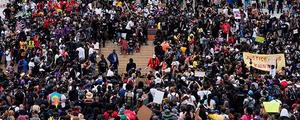Story Highlights
- 37% of U.S. adults have "a lot" or "some" knowledge about Juneteenth
- Support for creating a federal holiday mixed; is high among Black adults
- Greater levels of support for teaching Juneteenth in public schools
This study is brought to you by the Gallup Center on Black Voices. Sign up to receive the latest insights.
WASHINGTON, D.C. -- Most states officially observe June 19 in some way to mark the abolition of slavery in the U.S. As the date approaches this year, a new Gallup poll finds just over a third of Americans report having a lot (12%) or some knowledge (25%) about the "Juneteenth" celebration. Another 34% reporting knowing a little about it, while 28% report knowing nothing at all.
More than two in three Black Americans (69%) say they have a lot or some knowledge about Juneteenth, compared with 40% of Hispanic Americans and 31% of White Americans.
Democrats are more likely to be familiar with Juneteenth than independents and Republicans, with close to half of Republicans, 45%, saying they know nothing at all about the observance. Younger adults are also more likely to be familiar with it than older adults.
| A lot | Some | A little bit | Nothing at all | ||||||||||||||||||||||||||||||||||||||||||||||||||||||||||||||||||||||||||||||||||||||||||||||||
|---|---|---|---|---|---|---|---|---|---|---|---|---|---|---|---|---|---|---|---|---|---|---|---|---|---|---|---|---|---|---|---|---|---|---|---|---|---|---|---|---|---|---|---|---|---|---|---|---|---|---|---|---|---|---|---|---|---|---|---|---|---|---|---|---|---|---|---|---|---|---|---|---|---|---|---|---|---|---|---|---|---|---|---|---|---|---|---|---|---|---|---|---|---|---|---|---|---|---|---|
| % | % | % | % | ||||||||||||||||||||||||||||||||||||||||||||||||||||||||||||||||||||||||||||||||||||||||||||||||
| National adults | 12 | 25 | 34 | 28 | |||||||||||||||||||||||||||||||||||||||||||||||||||||||||||||||||||||||||||||||||||||||||||||||
| Black adults | 37 | 32 | 27 | 4 | |||||||||||||||||||||||||||||||||||||||||||||||||||||||||||||||||||||||||||||||||||||||||||||||
| Hispanic adults | 13 | 27 | 31 | 29 | |||||||||||||||||||||||||||||||||||||||||||||||||||||||||||||||||||||||||||||||||||||||||||||||
| White adults | 7 | 24 | 36 | 32 | |||||||||||||||||||||||||||||||||||||||||||||||||||||||||||||||||||||||||||||||||||||||||||||||
| Democrats | 18 | 29 | 36 | 16 | |||||||||||||||||||||||||||||||||||||||||||||||||||||||||||||||||||||||||||||||||||||||||||||||
| Independents | 10 | 27 | 35 | 27 | |||||||||||||||||||||||||||||||||||||||||||||||||||||||||||||||||||||||||||||||||||||||||||||||
| Republicans | 5 | 18 | 32 | 45 | |||||||||||||||||||||||||||||||||||||||||||||||||||||||||||||||||||||||||||||||||||||||||||||||
| 18-34 | 13 | 29 | 36 | 21 | |||||||||||||||||||||||||||||||||||||||||||||||||||||||||||||||||||||||||||||||||||||||||||||||
| 35-54 | 12 | 26 | 34 | 27 | |||||||||||||||||||||||||||||||||||||||||||||||||||||||||||||||||||||||||||||||||||||||||||||||
| 55+ | 10 | 22 | 33 | 34 | |||||||||||||||||||||||||||||||||||||||||||||||||||||||||||||||||||||||||||||||||||||||||||||||
| Gallup Panel, May 18-23, 2021 | |||||||||||||||||||||||||||||||||||||||||||||||||||||||||||||||||||||||||||||||||||||||||||||||||||
These data are from a web-based Gallup Panel survey conducted May 18-23.
Juneteenth -- also known as "Juneteenth Independence Day," "Freedom Day" or "Emancipation Day" -- commemorates the event on June 19, 1865, when slaves in Texas were informed of their freedom after Confederate general Robert E. Lee's surrender in the U.S. Civil War. The announcement came more than two and a half years after President Abraham Lincoln issued the Emancipation Proclamation, which promised freedom upon Union victory in the war to people held as slaves in the rebel states. The state of Texas became the first U.S. state to make Juneteenth a holiday in 1980, and today, 45 states and the District of Columbia have recognized the day in some way -- as a state holiday, a day of observance or a commemoration.
More Favor Than Oppose Making Juneteenth a National Holiday
Attempts at making Juneteenth a national holiday, including efforts in Congress this year, have not been successful.
Thirty-five percent of Americans say Juneteenth should be made a federal holiday, while one in four say it should not be. A plurality (40%) is unsure, including the 28% of U.S. adults who know nothing at all about the holiday.
Black adults (69%) are the subgroup most supportive of making Juneteenth a federal holiday. About four in 10 Hispanic adults (39%) support making it a federal holiday, while 27% of White adults agree.
| Yes | No | Don't know/Unfamiliar with Juneteenth | |||||||||||||||||||||||||||||||||||||||||||||||||||||||||||||||||||||||||||||||||||||||||||||||||
|---|---|---|---|---|---|---|---|---|---|---|---|---|---|---|---|---|---|---|---|---|---|---|---|---|---|---|---|---|---|---|---|---|---|---|---|---|---|---|---|---|---|---|---|---|---|---|---|---|---|---|---|---|---|---|---|---|---|---|---|---|---|---|---|---|---|---|---|---|---|---|---|---|---|---|---|---|---|---|---|---|---|---|---|---|---|---|---|---|---|---|---|---|---|---|---|---|---|---|---|
| % | % | % | |||||||||||||||||||||||||||||||||||||||||||||||||||||||||||||||||||||||||||||||||||||||||||||||||
| National adults | 35 | 25 | 40 | ||||||||||||||||||||||||||||||||||||||||||||||||||||||||||||||||||||||||||||||||||||||||||||||||
| Black adults | 69 | 14 | 18 | ||||||||||||||||||||||||||||||||||||||||||||||||||||||||||||||||||||||||||||||||||||||||||||||||
| Hispanic adults | 39 | 19 | 41 | ||||||||||||||||||||||||||||||||||||||||||||||||||||||||||||||||||||||||||||||||||||||||||||||||
| White adults | 27 | 29 | 44 | ||||||||||||||||||||||||||||||||||||||||||||||||||||||||||||||||||||||||||||||||||||||||||||||||
| Democrats | 57 | 11 | 32 | ||||||||||||||||||||||||||||||||||||||||||||||||||||||||||||||||||||||||||||||||||||||||||||||||
| Independents | 30 | 28 | 41 | ||||||||||||||||||||||||||||||||||||||||||||||||||||||||||||||||||||||||||||||||||||||||||||||||
| Republicans | 7 | 43 | 50 | ||||||||||||||||||||||||||||||||||||||||||||||||||||||||||||||||||||||||||||||||||||||||||||||||
| 18-34 | 52 | 15 | 33 | ||||||||||||||||||||||||||||||||||||||||||||||||||||||||||||||||||||||||||||||||||||||||||||||||
| 35-54 | 37 | 25 | 38 | ||||||||||||||||||||||||||||||||||||||||||||||||||||||||||||||||||||||||||||||||||||||||||||||||
| 55+ | 18 | 34 | 48 | ||||||||||||||||||||||||||||||||||||||||||||||||||||||||||||||||||||||||||||||||||||||||||||||||
| Gallup Panel, May 18-23, 2021 | |||||||||||||||||||||||||||||||||||||||||||||||||||||||||||||||||||||||||||||||||||||||||||||||||||
Most Democrats (57%) say a new federal holiday should be established to commemorate Juneteenth, while three in 10 independents agree (30%). Among Republicans, 7% are in favor of making Juneteenth a national holiday, 43% are opposed and 50% do not have an opinion.
A slim majority of young adults (52%) support creating a new federal holiday for Juneteenth, though support dwindles with each older age group -- as does familiarity with the holiday.
Greater Support for Adding Juneteenth to Public School Curriculums
Americans are more supportive of teaching the history of Juneteenth in schools than of making it a federal holiday. Nearly half (49%) say it should be added to public schools' history curricula, with most others (35%) unsure or not familiar with the issue. Sixteen percent are opposed.
Among racial groups, the vast majority of Black Americans (84%) say it should be taught in schools, while a small majority of Hispanic adults (54%) agree. Less than half of White Americans (42%) say Juneteenth should be taught in public school history classes, though this figure is more than twice as large as the percentage of those who are opposed.
About three in four Democrats (74%) support making the event part of school curriculums, compared with nearly half of independents (47%). Relatively few Republicans, 17%, support adding Juneteenth to history curriculums, while 31% are opposed.
Majorities of adults aged 18 to 34 (64%) and 35 to 54 (52%) say the event should be taught in schools, while roughly a third of adults aged 55 and older (36%) agree -- though support outweighs opposition among older adults.
| Yes | No | Don't know/Unfamiliar with Juneteenth | |||||||||||||||||||||||||||||||||||||||||||||||||||||||||||||||||||||||||||||||||||||||||||||||||
|---|---|---|---|---|---|---|---|---|---|---|---|---|---|---|---|---|---|---|---|---|---|---|---|---|---|---|---|---|---|---|---|---|---|---|---|---|---|---|---|---|---|---|---|---|---|---|---|---|---|---|---|---|---|---|---|---|---|---|---|---|---|---|---|---|---|---|---|---|---|---|---|---|---|---|---|---|---|---|---|---|---|---|---|---|---|---|---|---|---|---|---|---|---|---|---|---|---|---|---|
| % | % | % | |||||||||||||||||||||||||||||||||||||||||||||||||||||||||||||||||||||||||||||||||||||||||||||||||
| National adults | 49 | 16 | 35 | ||||||||||||||||||||||||||||||||||||||||||||||||||||||||||||||||||||||||||||||||||||||||||||||||
| Black adults | 84 | 6 | 10 | ||||||||||||||||||||||||||||||||||||||||||||||||||||||||||||||||||||||||||||||||||||||||||||||||
| Hispanic adults | 54 | 11 | 36 | ||||||||||||||||||||||||||||||||||||||||||||||||||||||||||||||||||||||||||||||||||||||||||||||||
| White adults | 42 | 19 | 30 | ||||||||||||||||||||||||||||||||||||||||||||||||||||||||||||||||||||||||||||||||||||||||||||||||
| Democrats | 74 | 4 | 22 | ||||||||||||||||||||||||||||||||||||||||||||||||||||||||||||||||||||||||||||||||||||||||||||||||
| Independents | 47 | 18 | 35 | ||||||||||||||||||||||||||||||||||||||||||||||||||||||||||||||||||||||||||||||||||||||||||||||||
| Republicans | 17 | 31 | 52 | ||||||||||||||||||||||||||||||||||||||||||||||||||||||||||||||||||||||||||||||||||||||||||||||||
| 18-34 | 64 | 9 | 27 | ||||||||||||||||||||||||||||||||||||||||||||||||||||||||||||||||||||||||||||||||||||||||||||||||
| 35-54 | 52 | 16 | 32 | ||||||||||||||||||||||||||||||||||||||||||||||||||||||||||||||||||||||||||||||||||||||||||||||||
| 55+ | 36 | 21 | 44 | ||||||||||||||||||||||||||||||||||||||||||||||||||||||||||||||||||||||||||||||||||||||||||||||||
| Gallup Panel, May 18-23, 2021 | |||||||||||||||||||||||||||||||||||||||||||||||||||||||||||||||||||||||||||||||||||||||||||||||||||
Bottom Line
Debate about making Juneteenth a federal holiday has been renewed in the racial reckoning that emerged after George Floyd's death at the hands of Minneapolis police last year. While the celebration is recognized in the vast majority of states, attempts to make it a national holiday have so far been unsuccessful. Congress has not established a new national holiday since 1983, when it did so for Martin Luther King Jr. Day.
With the heightened media and public attention to issues of racial justice in the past year, it is likely that this poll, conducted in 2021, reflects a higher level of awareness of Juneteenth than existed prior to the national dialogue that began in 2020.
While most Americans currently report having at least a little knowledge of the historical event and its celebration, more than one in four say they know nothing about it. Meanwhile, nearly all Black Americans know about Juneteenth to some extent, including more than two-thirds knowing a lot or some.
Black Americans strongly support creating a new federal holiday for Juneteenth, though support is mixed or low among most other subgroups, largely because other subgroups are less familiar with it. However, national adults who are familiar with Juneteenth are slightly more in support than in opposition to making it a federal holiday.
Teaching about the event as part of U.S. history enjoys greater public support -- and if successful, should increase public awareness of Juneteenth -- and perhaps increase support for making it a public holiday as well.
Learn more about how the Gallup Panel works.




